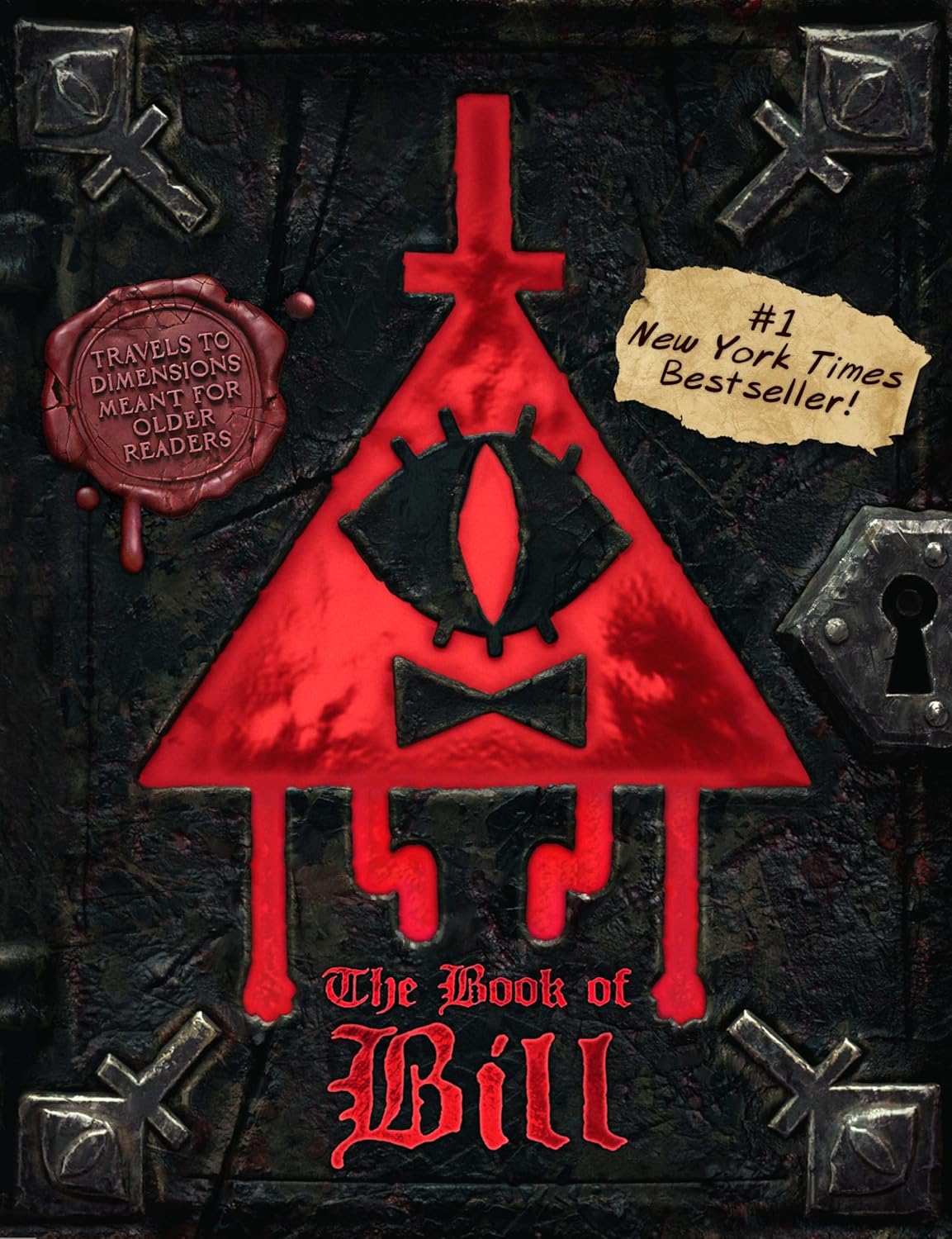Book Summary
In The Book of Bill, Alex Hirsch resurrects Gravity Falls’ most infamous villain, Bill Cipher, for a chaotic memoir “written” by the demon himself. The book unveils Bill’s bizarre origins, his influence on human history, and step-by-step instructions for world domination—complete with cursed illustrations, uncrackable ciphers, and embarrassing Pines family secrets. Framed as a self-aware manifesto, it blends dark humor with grotesque visuals, from bloody fingerprints to chapters on “Silly Straws” and existential nihilism. Fans of the show will relish the expanded lore, while newcomers face a surreal crash course in Bill’s madness.
Hirsch masterfully balances parody and horror, crafting a book that feels like a dangerous artifact from the Gravity Falls universe. The 208-page hardcover is packed with interactive elements: riddles, hidden messages, and even “lost pages” from Journal 3. Despite its cartoonish roots, the content is decidedly adult—Common Sense Media warns of gory imagery, occult themes, and Bill’s relentless nihilism, dubbing it a “Satanic bible for kids” (though it’s aimed at teens and adults).
Key Themes
Chaos vs. Control: Bill’s philosophy rejects morality as a “flexible concept,” urging readers to “create your own meaning” through destruction and absurdity. The book satirizes self-help tropes with chapters like “How to Cheat Death” and “Why Love Is a Trick,” all while weaving in Gravity Falls’ mythology. Bill’s clashes with deities like Time Baby and his self-proclaimed godhood underscore the theme of power as illusion.
Meta-Storytelling: Hirsch breaks the fourth wall, with Bill acknowledging his fictional status and manipulating the reader through coded messages and “deals.” The book’s design—stained pages, mirrored text, and shifting narratives—mirrors Bill’s reality-warping powers. Even Grunkle Stan sneaks in warnings, calling Bill a “needy theater kid” in a meta-commentary on fandom’s love for villains.
What Makes It Unique
Interactive Madness: Unlike typical tie-ins, The Book of Bill demands participation. Readers decode ciphers, solve riddles, and confront pages that “rewrite themselves” (like a blank “heaven guide” after Bill promises answers). The mix of collage art, comic strips, and grotesque photos creates a tactile, immersive experience—one reviewer described it as “a serial killer’s dream journal.”
Grown-Up Gravity Falls: While the show balanced kid-friendly scares, this book leans into horror. Realistic illustrations of severed body parts, occult rituals, and Bill’s nihilistic rants (e.g., “arms and legs can be sanded down to nubs”) target the original audience—now adults. Yet Hirsch’s wit shines, like a chapter blaming the Salem Witch Trials on Bill’s “gifts” to “unsatisfied Puritan women.”
Reader Reactions
Fans praise the book’s audacity: “I reverted back to my insufferable 14-year-old self—thanks, Bill!” Others highlight its puzzles: “I cracked codes like I was 9 again… worth the existential dread.” Parental reviews are polarized—some call it “too grotesque,” while teens adore its “edgy” humor. Notably, Guillermo del Toro jokingly warned it “infects your dreams,” while “Weird Al” Yankovic renamed himself “Normal Al” after reading.
Social media trends reveal fans dissecting hidden lore, like Bill’s post-Weirdmageddon fate or encrypted messages in the illustrations. The #BookOfBill hashtag showcases fan art, theories, and—inevitably—jokes about “accidentally summoning Bill.”
About the Author
Alex Hirsch, creator of Gravity Falls, is a CalArts-trained animator and voice actor (he voiced Bill and Stan). Known for blending humor with horror, his work on Flapjack and Journal 3 (a NYT bestseller) laid groundwork for this book’s tone. Hirsch insists he wasn’t “demonically possessed” while writing—though the book’s “cursed” vibe suggests otherwise.
His connection to Bill runs deep: the character was inspired by “the worst parts of myself and capitalism.” This meta-angle fuels the book’s satire, with Bill mocking consumerism (e.g., branding occult symbols as merch) and fandom’s embrace of villains.
Memorable Quotes
“Shame is a powerful emotion. But it grows in the dark.” — Bill on vulnerability as weakness
“Your reality is made of codes, madness, and tiny, tiny LEGOs.” — Bill’s cosmology, mocking existentialism
“Look, take it from a master con artist: if a deal seems too good to be true, that’s because it is.” — Grunkle Stan’s hidden rebuttal
